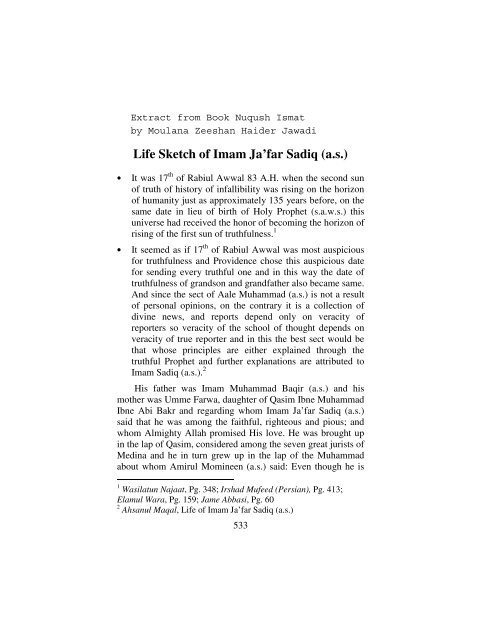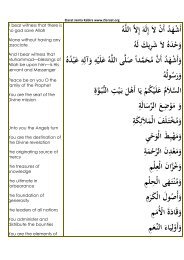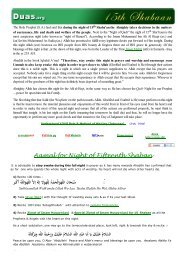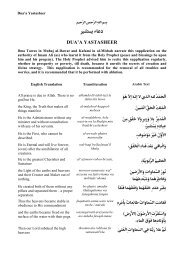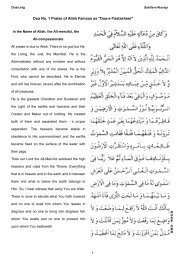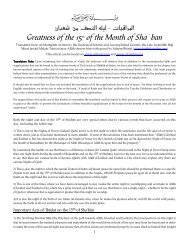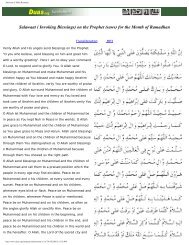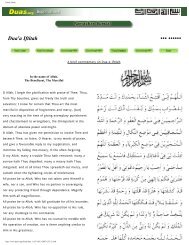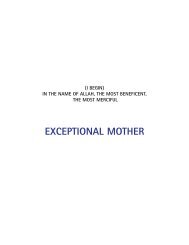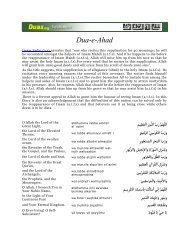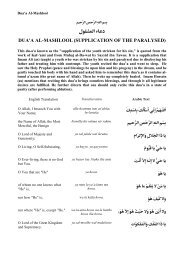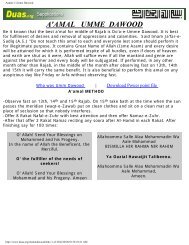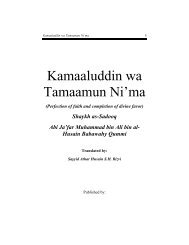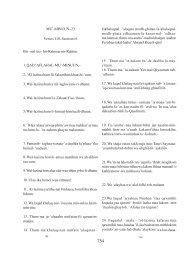Life Sketch of Imam Ja'far Sadiq (a.s.) - Dua
Life Sketch of Imam Ja'far Sadiq (a.s.) - Dua
Life Sketch of Imam Ja'far Sadiq (a.s.) - Dua
You also want an ePaper? Increase the reach of your titles
YUMPU automatically turns print PDFs into web optimized ePapers that Google loves.
<strong>Life</strong> <strong>Sketch</strong> <strong>of</strong> <strong>Imam</strong> Ja’far <strong>Sadiq</strong> (a.s.)<br />
• It was 17 th <strong>of</strong> Rabiul Awwal 83 A.H. when the second sun<br />
<strong>of</strong> truth <strong>of</strong> history <strong>of</strong> infallibility was rising on the horizon<br />
<strong>of</strong> humanity just as approximately 135 years before, on the<br />
same date in lieu <strong>of</strong> birth <strong>of</strong> Holy Prophet (s.a.w.s.) this<br />
universe had received the honor <strong>of</strong> becoming the horizon <strong>of</strong><br />
rising <strong>of</strong> the first sun <strong>of</strong> truthfulness. 1<br />
• It seemed as if 17 th <strong>of</strong> Rabiul Awwal was most auspicious<br />
for truthfulness and Providence chose this auspicious date<br />
for sending every truthful one and in this way the date <strong>of</strong><br />
truthfulness <strong>of</strong> grandson and grandfather also became same.<br />
And since the sect <strong>of</strong> Aale Muhammad (a.s.) is not a result<br />
<strong>of</strong> personal opinions, on the contrary it is a collection <strong>of</strong><br />
divine news, and reports depend only on veracity <strong>of</strong><br />
reporters so veracity <strong>of</strong> the school <strong>of</strong> thought depends on<br />
veracity <strong>of</strong> true reporter and in this the best sect would be<br />
that whose principles are either explained through the<br />
truthful Prophet and further explanations are attributed to<br />
<strong>Imam</strong> <strong>Sadiq</strong> (a.s.). 2<br />
His father was <strong>Imam</strong> Muhammad Baqir (a.s.) and his<br />
mother was Umme Farwa, daughter <strong>of</strong> Qasim Ibne Muhammad<br />
Ibne Abi Bakr and regarding whom <strong>Imam</strong> Ja’far <strong>Sadiq</strong> (a.s.)<br />
said that he was among the faithful, righteous and pious; and<br />
whom Almighty Allah promised His love. He was brought up<br />
in the lap <strong>of</strong> Qasim, considered among the seven great jurists <strong>of</strong><br />
Medina and he in turn grew up in the lap <strong>of</strong> the Muhammad<br />
about whom Amirul Momineen (a.s.) said: Even though he is<br />
1 Wasilatun Najaat, Pg. 348; Irshad Mufeed (Persian), Pg. 413;<br />
Elamul Wara, Pg. 159; Jame Abbasi, Pg. 60<br />
2 Ahsanul Maqal, <strong>Life</strong> <strong>of</strong> <strong>Imam</strong> Ja’far <strong>Sadiq</strong> (a.s.)<br />
533
orn from loins <strong>of</strong> Abu Bakr, he is deserving to be called as my<br />
son and it was the consequence <strong>of</strong> the sonship <strong>of</strong> Ali (a.s.) that<br />
the ruler <strong>of</strong> Syria punished him in such a severe manner by<br />
having him burnt alive in a donkey skin. 1<br />
• Such was the personal academic excellence <strong>of</strong> Umme<br />
Farwa that once when she touched Hajar Aswad with her<br />
left hand someone objected to it saying that it was against<br />
prophetic practice; she said: We belong to the family that is<br />
needless <strong>of</strong> knowledge <strong>of</strong> people like you. 2<br />
• The name <strong>of</strong> <strong>Imam</strong> <strong>Sadiq</strong> (a.s.) was Ja’far, which means<br />
‘river’ and it is also the name <strong>of</strong> a great river in Paradise,<br />
through which Providence wanted to imply that through his<br />
knowledge and perfections a world is going to benefit and<br />
the vastness <strong>of</strong> his sciences are like gardens <strong>of</strong> Paradise and<br />
one who really benefits from him is like one who is in<br />
Paradise. 3<br />
• His Kunniyat was Abu Abdullah and titles were: Sabir,<br />
Fazil and <strong>Sadiq</strong> etc. <strong>of</strong> which the title <strong>of</strong> <strong>Sadiq</strong>, Holy<br />
Prophet (s.a.w.s.) had gifted when he mentioned his<br />
successors and he said: That successor <strong>of</strong> mine will be<br />
called <strong>Sadiq</strong>. 4 And another wisdom <strong>of</strong> this is revealed<br />
because a person called Ja’far Kazzab also appeared in<br />
Aale Muhammad (a.s.); who raised a false claim <strong>of</strong><br />
<strong>Imam</strong>ate against the <strong>Imam</strong> <strong>of</strong> the time and became famous<br />
as Kazzab. Therefore to avoid this misunderstanding the<br />
sixth <strong>Imam</strong> was always referred to as <strong>Sadiq</strong> although the<br />
second Ja’far later became Tawwab (repentant), but he is<br />
generally called as Kazzab. 5<br />
1 Ahsanul Maqal, Pg. 704; Tabari, Masudi, Tarikh Kamil, Vol. 3, Pg.<br />
143<br />
2 Traditional report <strong>of</strong> Abdul Aala; Ahsanul Maqal, Pg. 704<br />
3 Arjahul Matalib, Pg. 361<br />
4 Jilaul Uyun, Pg. 264<br />
5 Muntahiul Aamaal; Al-Kharaij wal Jaraih, Pg. 195<br />
534
• Regarding him, his mother has said that when he was in the<br />
womb he used to speak to his mother regularly and even<br />
after his birth the first words that he uttered were the two<br />
testimonies <strong>of</strong> Muslim faith and once more clarified that<br />
<strong>Imam</strong> does not embrace Islam, he brings it with himself. 1<br />
The inscription on his finger ring said: Allahu Walyyi wa<br />
ismati min khalqihi. (Allah is my Wali and my infallibility is<br />
divinely bestowed). 2<br />
Allahu Khaaliqu kulli shayyin. (Allah is the creator <strong>of</strong><br />
everything). 3<br />
Anta thiqati fa-simni minan naas (Only You are my trusted<br />
one so protect me from the people). 4<br />
Maa shaa Allah Laa quwwata illa billaah Astaghfirullah<br />
(As Allah willed. There is no strength except by Allah. I seek<br />
the forgiveness <strong>of</strong> Allah). 5<br />
• Another excellence <strong>of</strong> the date <strong>of</strong> his birth is that this date<br />
is included among those four days <strong>of</strong> the year when it is<br />
most excellent to observe fast and in which important dates<br />
like 17 th Rabiul Awwal, 25 th Zilqad, 27 th Rajab and 18 th<br />
Zilhajj, day <strong>of</strong> Ghadeer Khum are also included. 6<br />
• He was born during the rule <strong>of</strong> Abdul Malik Ibne Marwan<br />
who ruled till 86 A.H. In 86 A.H. when Abdul Malik died,<br />
for ten years upto 96 A.H. Walid Ibne Abdul Malik ruled.<br />
After Walid, Sulaiman Ibne Abdul Malik remained in<br />
power from 96 to 97 A.H. In 97 A.H. Umar Ibne Abdul<br />
Aziz came to power for sometime after which on 100 A.H.<br />
Yazid Ibne Abdul Malik became the ruler and then after<br />
1 Jilaul Uyun, Pg. 265<br />
2 Amali, Shaykh Saduq, Pg. 458<br />
3 Misbah, Kafami, Pg. 522; Al-Kafi, Vol. 6, Pg. 473<br />
4 Makarimul Akhlaq, Pg. 95<br />
5 Fusulil Muhimma, Pg. 209<br />
6 Jannaatul Khulud, Pg. 27; Ahsanul Maqal, Pg. 307<br />
535
five years 105 A.H. Hisham Ibne Abdul Malik came to<br />
power who remained in power for twenty years. In 125<br />
A.H. Walid Ibne Yazid Ibne Abdul Malik came to the<br />
throne, but he died within a short time in 126 A.H. Yazid<br />
Naaqis came to power who also died after some days and<br />
the kingdom went to Ibrahim Ibne Walid and after that<br />
Marwan Himar came to power and with his death the<br />
Umayyad dynasty came to an end and Abu Abbas Saffah<br />
seized the throne in 132 A.H. and the Abbasid rule began.<br />
After four year rule <strong>of</strong> Abul Abbas Saffah, Mansur<br />
Dawaniqi came to the seat <strong>of</strong> power and ruled till 158 A.H.<br />
in which he had <strong>Imam</strong> Ja’far <strong>Sadiq</strong> (a.s.) poisoned in 148<br />
A.H. 1<br />
It becomes clear from history <strong>of</strong> Umayyads and Abbasides<br />
that there was no connection <strong>of</strong> Islamic rulership and caliphate<br />
had no connection with faith and character; and the whole<br />
system was running according to dynastic power. Thus its most<br />
interesting and edifying pro<strong>of</strong> is that in the list <strong>of</strong> Muslim<br />
caliphs, we find names like Yazid Naaqis (defective), Walid<br />
Fasiq (transgressor), Abul Abbas Saffah (blood shedder),<br />
Mansur Dawaniqi (greedy) and Marwan Himar (donkey). Even<br />
after all this they were all considered as caliphs <strong>of</strong> Muslims and<br />
it is the result <strong>of</strong> this Islamic taste that to this date Muslims<br />
rulers are seen to be irreligious, ignorant, wine lovers, gamblers<br />
and wantons and the Muslim world calls them Ulil Amr and<br />
considers their commands to be sanctioned by faith. How can<br />
that irreligiousity and bad character be compared to history <strong>of</strong><br />
one who is infallible and absolutely devoted to God? Some <strong>of</strong><br />
whose members are owners <strong>of</strong> knowledge and some owners <strong>of</strong><br />
good character, some <strong>of</strong> them are patience personified and<br />
some examples <strong>of</strong> worship; some are responsible for<br />
expounding knowledge and some models <strong>of</strong> truthfulness; some<br />
displayed forbearance and controlling <strong>of</strong> anger and some<br />
1 Elaamul Wara; Tarikh Ibnul Wardi; Tarikhul Aaimma, Pg. 436;<br />
Anwarul Husainia, Pg. 50<br />
536
expressed their contentment at divine will. Some were such<br />
that their piety became world famous and the purity <strong>of</strong><br />
conscience <strong>of</strong> some <strong>of</strong> them was extraordinary. Some <strong>of</strong> them<br />
are models <strong>of</strong> armed forces and some vested with reform <strong>of</strong><br />
humanity.<br />
• By the end <strong>of</strong> the rule <strong>of</strong> Abdul Malik, the age <strong>of</strong> <strong>Imam</strong><br />
Ja’far <strong>Sadiq</strong> (a.s.) was only three years, hence there is no<br />
question <strong>of</strong> any special contact with this regime. Sulaiman<br />
Ibne Abdul Malik, Walid Ibne Yazid Ibne Abdul Malik,<br />
Yazid Naaqis, Ibrahim Ibnul Walid and Marwan Himar,<br />
were rulers only for few days, so it is no use mentioning<br />
them.<br />
• During the lifetime <strong>of</strong> the <strong>Imam</strong>, in the first ten years,<br />
Walid Ibne Malik was the ruler and in the middle is twenty<br />
years’ rule <strong>of</strong> Hisham Ibne Abdul Malik and in the end for<br />
twenty or twenty-two years, it was the rule <strong>of</strong> Mansur<br />
Dawaniqi. But in those years also the whole period <strong>of</strong><br />
Walid’s rule and half the period <strong>of</strong> rulership <strong>of</strong> Hisham is<br />
related to <strong>Imam</strong> Muhammad Baqir (a.s.). After that in 114<br />
A.H., the <strong>Imam</strong>ate <strong>of</strong> <strong>Imam</strong> Ja’far <strong>Sadiq</strong> (a.s.) began whose<br />
initial confrontation was with Hisham Ibne Abdul Malik<br />
and the last confrontation was with Mansur Dawaniqi, but<br />
still to introduce the history <strong>of</strong> caliphate a brief mention <strong>of</strong><br />
some persons is necessary. 1<br />
• In the initial period <strong>of</strong> the <strong>Imam</strong>’s life, Walid Ibne Abdul<br />
Malik was in power, whose sinfulness was so famed that he<br />
committed fornication with his beautiful daughter and<br />
when someone objected that it would bring disgrace, he<br />
clearly said: Those who worry about the criticism <strong>of</strong> others<br />
can never achieve their aim. 2<br />
1 Elaamul Wara, etc.<br />
2 Tarikh Aaimma<br />
537
• Once, that oppressor planned to drink wine on the ro<strong>of</strong> <strong>of</strong><br />
the Kaaba so that it should become clear to the whole world<br />
that except for dignity <strong>of</strong> caliph no one else has any respect<br />
and honor. He divined through the Quran whether to<br />
proceed to the battle or not and when a verse advising<br />
against his wish came out he made the Quran a target <strong>of</strong> his<br />
arrows and said: On Judgment Day tell your God that I was<br />
shredded by Walid.<br />
This is the faith <strong>of</strong> Muslims on Quran that they consider<br />
such individuals as caliphs <strong>of</strong> Muslims and criticize the<br />
followers <strong>of</strong> Ahle Bayt (a.s.) that they have no faith in Quran.<br />
Indeed if faith <strong>of</strong> Quran necessitates shooting at the Quran then<br />
may Allah protect every Muslim from such a faith. 1<br />
• Another achievement <strong>of</strong> Walid is that on hearing the sound<br />
<strong>of</strong> Azaan, he started copulating with his slave girl and when<br />
Muslims came to summon him to lead the prayers, he sent<br />
that same slave girl wearing his dress and sincere Muslims<br />
prayed behind the slave girl with humility. And it again<br />
became clear that followers <strong>of</strong> Bani Umayyah can neither<br />
distinguish between a male or female camel nor between a<br />
man or woman; they are prepared to accept everyone as<br />
their <strong>Imam</strong> and guide; on the contrary as much one is<br />
irreligious, as great a caliph and master <strong>of</strong> affairs <strong>of</strong> the<br />
Ummah he would be. 2<br />
• The cousin <strong>of</strong> <strong>Imam</strong> Ja’far <strong>Sadiq</strong> (a.s.), Yahya Ibne Zaid<br />
was killed by this same oppressor and his corpse was hung<br />
from the crucifix and after that had it burnt. In this way the<br />
reality <strong>of</strong> Islamic caliphate was also revealed and the fire <strong>of</strong><br />
greed <strong>of</strong> the Muslim caliph was also doused. 3<br />
1 Tarikh Khamis, Umdatud Talib, Habibus Sayr etc.<br />
2 Tarikh Khamis; Habibus Sayr; Hijajul Karama, Hasan Siddiq<br />
Sahab<br />
3 Tarikh Islam, Vol. 1, Pg. 48<br />
538
• The period <strong>of</strong> Hisham’s rule was the period <strong>of</strong> the youth <strong>of</strong><br />
the Holy <strong>Imam</strong> (a.s.). When he was directly observing the<br />
calamities being sent from Hisham and on some occasions<br />
he was also a target <strong>of</strong> those harassments. Hisham was<br />
extremely cunning, miserly, <strong>of</strong> nasty temperament,<br />
obstinate, bad mannered, greedy and suspicious sort <strong>of</strong><br />
man. He used to have people killed on mere suspicion.<br />
Killing <strong>of</strong> Aale Muhammad (a.s.) was his special hobby.<br />
Thus from 105 A.H. to 120 A.H. he kept Khalid Ibne<br />
Abdullah Qasri as the governor <strong>of</strong> Iraq, who spread a<br />
general carnage and much <strong>of</strong> irreligiosity and Hisham was<br />
made out to be better than Holy Prophet (s.a.w.s.). 1<br />
• When on the occasion <strong>of</strong> Hajj, Hisham witnessed the<br />
greatness <strong>of</strong> <strong>Imam</strong> Zainul Abideen (a.s.), he was burnt in<br />
jealousy and when Farazdaq recited the panegyric in his<br />
praise, he had him imprisoned at Asfan and punished him<br />
severely. 2<br />
• That same person had Zaid martyred; had his corpse hung<br />
from the crucifix for four years and at last had it burnt. 3<br />
• This same oppressor summoned <strong>Imam</strong> Muhammad Baqir<br />
(a.s.) from Medina to Syria and harassed him too much. At<br />
that time <strong>Imam</strong> Ja’far <strong>Sadiq</strong> (a.s.) was also in his company<br />
and on the way he converted the Christian monk to Islam<br />
through his personal excellence. 4<br />
• This same Hisham had criticized Zaid to be a son <strong>of</strong> a slave<br />
girl; so he said: His Eminence, Ismail (a.s.) who was<br />
himself a Prophet and the great ancestor <strong>of</strong> Holy Prophet<br />
(s.a.w.s.) was also born through Hajra, a slave girl <strong>of</strong><br />
1 Tarikh Kamil<br />
2 Jilaul Uyun<br />
3 Tarikh Khamis, Vol. 2, Pg. 357; Tarikh Islam, Vol. 1, Pg. 48;<br />
Umdatud Talib, Pg, 248<br />
4 Jilaul Uyun, Pg. 161-162<br />
539
Ibrahim (a.s.). Did this in any way reduce his status or did<br />
he become ineligible for prophethood? 1<br />
• Mansur Dawaniqi was the second ruler <strong>of</strong> Bani Abbas<br />
dynasty, whose administration and rulership is much<br />
extolled, but along with this all historians are unanimous<br />
that this person was extremely cruel and this is the secret <strong>of</strong><br />
his success that he used have people killed on mere<br />
suspicion; what to say about Hashemites and Alawites? He<br />
had <strong>Imam</strong> Malik lashed only because at some point <strong>of</strong> time<br />
he had supported the Saadaat and <strong>Imam</strong> Abu Hanifah was<br />
imprisoned because he had given allegiance to Zaid and in<br />
the end he had him poisoned. Having the Saadaat killed,<br />
having them buried alive in walls and using their blood in<br />
the concrete <strong>of</strong> buildings were usual activities <strong>of</strong> Mansur.<br />
Such was his cruelty that when Saadaat died in his prisons<br />
he did not even allow their last remains to be taken out; and<br />
in this way the air <strong>of</strong> prisons stank more. But Saadaat<br />
endured these conditions also and through recitation <strong>of</strong><br />
Quran they estimated the times for prayers and continued to<br />
endure life <strong>of</strong> dungeons. 2<br />
The existence <strong>of</strong> descendants <strong>of</strong> <strong>Imam</strong> Hasan (a.s.) was<br />
unbearable for Mansur; thus due to the protests <strong>of</strong> Abdullah bin<br />
Mahaz he was initially arrested and then both his sons were<br />
killed. When Nafse Zakiyyah finding Mansur’s atrocities<br />
unbearable rose up in revolt in Kufa; and Ibrahim raised the<br />
standard <strong>of</strong> revolt in Egypt, initially he had support <strong>of</strong> some<br />
people and an army was also raised; but in the end due to<br />
severity <strong>of</strong> confrontation the army was ineffective and both<br />
were killed amidst their forces. The determination <strong>of</strong> Saadaat<br />
was intact even after that; thus Abdullah Mahaz who had<br />
adopted a nomadic life and on one occasion had met his sons<br />
and made bequest to them that an honorable death was better<br />
1 Umdatud Talib, etc.<br />
2 Sawaiqul Mohriqa, Pg. 121<br />
540
than a life <strong>of</strong> degradation and it was on this basis that he had<br />
revolted. When the severed head <strong>of</strong> Nafse Zakiyyah was placed<br />
before Abdullah Mahaz and on concluding his prayers he saw<br />
it, he said: Well done, you have fulfilled the divine covenant<br />
and your sword has saved you from degradation <strong>of</strong> the world<br />
and your piety has saved you from punishment <strong>of</strong> the hereafter.<br />
Saying this he said to the one who brought the severed head:<br />
Tell Mansur that our job is accomplished; after that it is your<br />
turn and justice would be done in court <strong>of</strong> God anyway. After<br />
that he took such a deep breathe that he passed away and by<br />
presenting the sacrifice <strong>of</strong> his children, entered the court <strong>of</strong><br />
divinity in their company.<br />
• Atrocities <strong>of</strong> Mansur on the basis <strong>of</strong> which these people had<br />
considered staging a revolt as necessary, their ordinary<br />
scene was that he had arrested seventy to seventy-five<br />
Hasanid Saadaat from Medina and placed iron collars and<br />
chains upon them and took them out <strong>of</strong> Medina. Getting<br />
this information <strong>Imam</strong> Ja’far <strong>Sadiq</strong> (a.s.) came upto that<br />
place and was so moved by this scene that he began weep<br />
excessively and said: Now the sanctity <strong>of</strong> God and the<br />
Prophet also cannot be protected. After that he remained in<br />
fever for twenty days. He also tried to meet his uncle,<br />
Abdullah Mahaz and give him condolence <strong>of</strong> this tragedy,<br />
but the unjust people didn’t allow him. In this way they<br />
could not even share the sorrow <strong>of</strong> each other.<br />
It is clear that in view <strong>of</strong> such a cruel and heartless ruler,<br />
when life <strong>of</strong> ordinary Saadaat Hasani was unbearable, what can<br />
be said about <strong>Imam</strong> Ja’far <strong>Sadiq</strong> (a.s.), who was an epitome <strong>of</strong><br />
excellence? And his personality was absolutely sacred and<br />
honorable among people. How his existence could be bearable<br />
for Mansur? Thus he tried to have the <strong>Imam</strong> assassinated again<br />
and again and summoned him to the court with the aim to<br />
insult him and at last he should be killed. But so long as divine<br />
will is in favor <strong>of</strong> a life, no one can end it; and none can<br />
541
degrade one whom God exalts. 1<br />
Once when Mansur summoned the <strong>Imam</strong> intending to<br />
insult him, a housefly again and again disturbed Mansur and<br />
sat on his nose. He was fed up with it and at last exclaimed:<br />
Why God has created this fly? The <strong>Imam</strong> replied: To degrade<br />
the tyrants, so that they realize their worth and that they should<br />
understand how they are oppressing the whole world inspite <strong>of</strong><br />
being so helpless. 2<br />
On another occasion, when he summoned the <strong>Imam</strong>, he<br />
also gathered a large number <strong>of</strong> magicians who aimed to insult<br />
the <strong>Imam</strong> through their magical tricks; but Providence decreed<br />
it in such a way that the <strong>Imam</strong> gestured to the tiger on the<br />
carpet and it turned into a real beast and devoured the<br />
magicians. When Mansur asked the <strong>Imam</strong> to bring them back,<br />
the <strong>Imam</strong> said: If the staff <strong>of</strong> Musa had brought back the<br />
magicians. I would also have brought them back; but it cannot<br />
be done now. 3<br />
As if it was meant to be a reminder that we are the<br />
inheritors <strong>of</strong> Musa (a.s.) and you are the inheritor <strong>of</strong> Firon; thus<br />
whatever had been the fate <strong>of</strong> magicians <strong>of</strong> Firon the same fate<br />
is repeated for magicians <strong>of</strong> today; and the fate that befell Firon<br />
is soon going to befall Mansur as well.<br />
• On some occasions, Mansur even planned to have the<br />
house <strong>of</strong> <strong>Imam</strong> (a.s.) burnt down, so that all his family<br />
members may perish in the fire. Thus he followed his plan<br />
and the house caught fire. Companions tried all means to<br />
put it out, but the <strong>Imam</strong> paid no attention and in the end<br />
addressed the fire: Do you not know that I am son <strong>of</strong><br />
1 Jilaul Uyun, Pg. 269; Nurul Absar, Pg. 133; Sawaneh Umri<br />
Shaharda Masumin, Part 2, Pg. 2<br />
2 Ilalush Sharai, Pg. 496; Manaqib, Vol. 3, Pg. 375; Hilyatul Awliya,<br />
Vol. 3, Pg. 198; Matalibus So-ool, Pg. 82; Biharul Anwar, Vol. 8,<br />
Chapter, Pg. 189; Nurus Absar, Pg. 144<br />
3 Damatus Sakiba, Vol. 2, Pg. 513<br />
542
Ibrahim the Khalil? How can you dare to burn me or my<br />
family members? Thus the fire stopped and he waved the<br />
tails <strong>of</strong> his shirt making it a bough <strong>of</strong> flowers. 1<br />
• Mansur once gathered a hundred ignorant persons in his<br />
court and instructed them to attack and finish <strong>of</strong>f <strong>Imam</strong><br />
Ja’far <strong>Sadiq</strong> (a.s.) as soon as he entered. But Providence<br />
arranged it in such a way that when the <strong>Imam</strong> entered, all<br />
threw down their swords and fell at his feet and Mansur<br />
perceived a threat and had the <strong>Imam</strong> returned to his<br />
hometown the same night and then had him poisoned. 2<br />
Once, Mansur asked the <strong>Imam</strong> that why he was not afraid<br />
<strong>of</strong> him? <strong>Imam</strong> (a.s.) replied: Neither I have any worldly<br />
possession whose loss I may fear through you and nor you<br />
have anything from the hereafter, which I may hope from you.<br />
He said: Stay with me and continue to render advices to me. He<br />
said: One who is concerned for the hereafter would not stay<br />
with you and one who loves the world will not advise you. 3<br />
• An advantage <strong>of</strong> being repeatedly summoned to the court<br />
by Mansur was that the <strong>Imam</strong> continued to come before the<br />
people and people came to be informed <strong>of</strong> his excellence<br />
and conditions. Thus once Mansur summoned the <strong>Imam</strong> in<br />
presence <strong>of</strong> an Indian physician and he began a discourse as<br />
show <strong>of</strong>f. The <strong>Imam</strong> said: I know medicine better than you,<br />
don’t try to overawe me. He asked: What do you know? He<br />
said: The fundamental principles <strong>of</strong> medicine are that you<br />
must cure the ill through its opposite. You must cure heat<br />
through cold things and cold through hot things; after that<br />
stomach is the center <strong>of</strong> all diseases. So you must cure it<br />
first <strong>of</strong> all and then turn your attention to maladies. And<br />
third point is that precaution is the best cure.<br />
1 Tadkiratul Masoomeen, Pg. 181, quoted from Usul Kafi.<br />
2 Damatus Sakiba, Vol. 2, Pg. 481; Jannaatul Khulud, Pg. 28;<br />
Kashful Ghumma, Pg. 100<br />
3 Hayat <strong>Imam</strong> Musa Kazim (a.s.)<br />
543
The Indian physician agreed with this and the <strong>Imam</strong> said:<br />
This is not knowledge <strong>of</strong> book; it is a divine bestowal. After<br />
that he posed the following questions to him:<br />
(1). Why are the tears and other moistures housed in the<br />
head? (2) Why the hair grows from the head? (3) Why there is<br />
no hair on the forehead? (4) Why are there wrinkles on<br />
forehead? (5) Why eyelids cover the eyes? (6) Why is the nose<br />
placed between the eyes? (7) Why are eyes almond shaped? (8)<br />
Why is the aperture <strong>of</strong> nose facing downwards? (9) Why are<br />
there two lips over the mouth? (10) Why are the front teeth<br />
sharp and the morals broad? And why there are canines and<br />
premolars between them. (11) Why are both palms hairless?<br />
(12) Why men have facial hair? (13) Why there is no sense in<br />
nails and hair? (14) Why is the heart shaped like a cone? (15)<br />
Why the lungs are divided into two parts and why does it move<br />
at its place? (16) Why is the liver convex shaped? (17) Why is<br />
the kidney shaped like a bean? (18) Why do knees bend<br />
forward? (19) Why are both feet hollow in the centre?<br />
The Indian physician was bewildered by these questions<br />
and realized that he was not connected to the art <strong>of</strong> medicine;<br />
he was in fact connected to secrets <strong>of</strong> creation and mysteries <strong>of</strong><br />
universe and mysteries <strong>of</strong> universe could not be exposed,<br />
except by representative <strong>of</strong> creator <strong>of</strong> universe. So he asked the<br />
<strong>Imam</strong> to explain all these points and <strong>Imam</strong> replied them in<br />
proper order.<br />
(1) If the head had not been the center <strong>of</strong> moistures, it<br />
would have burst due severity <strong>of</strong> heat. (2) If the head was<br />
hairless oil would not have been able to reach to the roots and<br />
the brain would have not been safe from cold and hot. (3) The<br />
forehead is hairless as from there light reaches to the eyes. (4)<br />
There are wrinkles on forehead to protect the eyes from sweat<br />
etc. (5) Function <strong>of</strong> eyelashes is to ensure that intensity <strong>of</strong> sun<br />
may affect as per need and there is ease in sleeping as well. (6)<br />
Nose is placed between two eyes so that light could be divided<br />
in two parts before reaching the eyes. (7) Eyes are almond<br />
544
shaped so that Surma may be applied easily. (8) The nose<br />
aperture is placed downwards so that moistures may be easily<br />
exuded. (9) Lips are shaped as such so that moistures coming<br />
from above may not enter the mouth and that food may not fall<br />
out. (10) Facial hair is given to men so that a difference can be<br />
maintained between men and women. (11) Incisors are sharp to<br />
enable cutting <strong>of</strong> a thing easily and molars are broad to chew<br />
the food easily and the teeth between them are long to keep<br />
them in order. (12) There is no hair in palms to enable touch<br />
and to perceive hardness and s<strong>of</strong>tness (13) There is no feeling<br />
in nails and hair as they have to be pruned again and again.<br />
(14) Heart is conical so that it may enter the lungs easily and<br />
continue to be cooled through its air. (15) Lungs have two<br />
sections so that the heart remains between them. (16) Liver is<br />
convex so that it should remain just on top <strong>of</strong> the stomach and<br />
continue to digest food through its heat and weight. (17)<br />
Kidney is shaped like bean, because semen comes to it from<br />
behind and is expelled slowly through its contractions and<br />
dilations. (18) Knees do not bend backward to ease walking;<br />
otherwise one would fall down easily. (19) The base <strong>of</strong> feet is<br />
hollow so that legs may rise easily when pressure is exerted on<br />
them; otherwise it would have been difficult to lift the weight<br />
<strong>of</strong> the whole body.<br />
After getting these replies, the Indian physician asked in<br />
astonishment: From where have you gained this knowledge?<br />
He said: From my respected grandfather and he received it<br />
from Holy Prophet (s.a.w.s.) and he in turn gained it through<br />
the Lord <strong>of</strong> the worlds.<br />
As soon as he heard this, he began to recite the Muslim<br />
formula <strong>of</strong> faith and after embracing Islam, said: Indeed, you<br />
are having most knowledge from all the people <strong>of</strong> the time. 1<br />
1 Manaqib, Vol. 5, Pg. 46; Mumbai; Sawaneh Umri Shaharda<br />
Masumin, Part 2, Pg. 25<br />
545
Manners and morals <strong>of</strong> the Holy <strong>Imam</strong><br />
An example <strong>of</strong> the noble morals <strong>of</strong> <strong>Imam</strong> is that he sent a<br />
slave on some errand. When he was late in returning the <strong>Imam</strong><br />
went out to search for him and found him asleep in one spot.<br />
Instead <strong>of</strong> waking him up he sat at his head and fanned him.<br />
When the slave awoke, he was absolutely ashamed. <strong>Imam</strong> said:<br />
Day is for working and night is for sleep. Remember this<br />
henceforth. 1<br />
Another important incident is that when slaves gathered<br />
grains seeing the signs <strong>of</strong> famine; the <strong>Imam</strong> ordered them to<br />
sell the grain in the open market and said: All <strong>of</strong> us would live<br />
just as others. After that he said: Use wheat mixed with barley<br />
to bake bread so that we have a chance to share the hardships<br />
<strong>of</strong> others. 2<br />
He used to work in the orchards along with the slaves and<br />
when someone objected, he said: There is nothing wrong in<br />
bearing hardships in pursuit <strong>of</strong> livelihood; it is rewarding<br />
divinely. 3<br />
1 Manaqib, Vol. 5, Pg. 52<br />
2 Manaqib, Vol. 5, Pg. 53; <strong>Sadiq</strong> Aale Muhammad, Pg. 12<br />
3 Manaqib, Vol. 5, Pg. 54; <strong>Sadiq</strong> Aale Muhammad, Pg. 12<br />
546
Evidences <strong>of</strong> <strong>Imam</strong>ate<br />
Confessions<br />
His Eminence, <strong>Imam</strong> Ja’far <strong>Sadiq</strong> (a.s.) became the<br />
successor <strong>of</strong> his father due to his superiority and excellence. 1<br />
He was from Saadaat <strong>of</strong> Ahle Bayt (a.s.) and his<br />
excellence is not in need <strong>of</strong> any explanation. 2<br />
He was an infallible and protected like his holy ancestors. 3<br />
He did not commit any sinful act from the time <strong>of</strong> his birth<br />
right upto his passing away and that is why he is called<br />
Masoom. 4<br />
He was the greatest member <strong>of</strong> Ahle Bayt (a.s.) and he had<br />
mastery on all sciences; he was a source <strong>of</strong> Quranic<br />
interpretation. He was a sea <strong>of</strong> knowledge and strange<br />
phenomena. 5<br />
Among the twelve <strong>Imam</strong>s, he was a great jurist, scholar<br />
and reliable source <strong>of</strong> traditions. He is the teacher <strong>of</strong> traditions<br />
to Abu Hanifah and <strong>Imam</strong> Malik. 6<br />
Scholars like Yahya Ibne Saeed, Ibne Juraih, <strong>Imam</strong> Malik,<br />
<strong>Imam</strong> Sufyan Thawri, Sufyan Ibne Uyyana, Abu Hanifah and<br />
1 Sawaiqul Mohriqa, Ibne Hajar Makki, Pg. 120<br />
2 Wafayatul Ayan, Ibne Khallikan, Vol. 1, Pg. 105<br />
3 Mawaddatul Qurba, Sayyid Ali Hamadani, Pg. 34, Mumbai 1310<br />
A.H.<br />
4 Dirasaatul Labeeb, Pg. 200<br />
5 Matalibus So-ool, Ibne Talha Shafei, Pg. 273<br />
6 Allamah Wahiduz Zaman Hyderabadi<br />
547
Ayyub etc. have narrated traditions from him. 1<br />
Abu Hanifah continued to attend the classes <strong>of</strong> <strong>Imam</strong><br />
Muhammad Baqir (a.s.) with the aim <strong>of</strong> learning and a major<br />
part <strong>of</strong> knowledge <strong>of</strong> Abu Hanifah was obtained from <strong>Imam</strong>.<br />
Abu Hanifah also studied under <strong>Imam</strong> Ja’far <strong>Sadiq</strong> (a.s.), son<br />
<strong>of</strong> <strong>Imam</strong> Muhammad Baqir (a.s.) which is mentioned in all<br />
histories. Ibne Taymiyyah has denied this under the pretext that<br />
<strong>Imam</strong> Abu Hanifah was a contemporary <strong>of</strong> <strong>Imam</strong> Ja’far <strong>Sadiq</strong><br />
(a.s.) so how he could have studied under him? But it is the<br />
insolence and mistake <strong>of</strong> Ibne Taymiyyah; however learned<br />
Abu Hanifah might be, how he can be compared to <strong>Imam</strong><br />
Ja’far <strong>Sadiq</strong> (a.s.) in excellence; traditions, Jurisprudence? On<br />
the contrary all sciences originated from houses <strong>of</strong> Ahle Bayt<br />
(a.s.) and the inmates <strong>of</strong> the house know well what is there in<br />
it. 2<br />
He used to say: We have been bestowed with the faculty <strong>of</strong><br />
knowledge <strong>of</strong> past and present; and the capability <strong>of</strong> divine<br />
inspiration and ability to listen to the talks <strong>of</strong> angels. 3<br />
The great teacher, Jabir Ibne Hayyan Ibne Abdullah was<br />
born in Kufa. In the initial period <strong>of</strong> his life, he gained<br />
expertise on natural sciences and to a great extent learnt from<br />
<strong>Imam</strong> Ja’far <strong>Sadiq</strong> (a.s.), son <strong>of</strong> <strong>Imam</strong> Muhammad Baqir<br />
(a.s.). 4<br />
Statements <strong>of</strong> <strong>Imam</strong> Ja’far <strong>Sadiq</strong> (a.s.) are present on the<br />
science <strong>of</strong> chemistry and numerology and his student was Jabir<br />
Ibne Hayyan Sufi Tarsoosi, who wrote a thousand page book in<br />
which he collected five hundred treatises <strong>of</strong> <strong>Imam</strong> Ja’far <strong>Sadiq</strong><br />
(a.s.). 5<br />
1 Allamah Shablanji, Ibne Khallikan, Vol. 1, Pg. 130<br />
2 Seeratun Noman, Allamah Shibli<br />
3 Shawahidun Nubuwwah, Jami<br />
4 Encyclopedia <strong>of</strong> Islamic Chemistry<br />
5 Wafayatul Ayan, Ibne Khallikan, Vol. 1, Pg. 130<br />
548
Jabir Ibne Hayyan collected five hundred treatises <strong>of</strong><br />
<strong>Imam</strong> Ja’far <strong>Sadiq</strong> (a.s.) and compiled a book <strong>of</strong> a thousand<br />
pages. 1<br />
In brief it can be said that sum total <strong>of</strong> all companions <strong>of</strong><br />
all the holy <strong>Imam</strong>s come to four thousand five hundred <strong>of</strong><br />
whom 4000 are only companions <strong>of</strong> <strong>Imam</strong> Ja’far <strong>Sadiq</strong> (a.s.)<br />
who are mentioned in books and in this way among <strong>of</strong><br />
companions <strong>of</strong> <strong>Imam</strong>s, the number <strong>of</strong> authors are one thousand<br />
three hundred; from whom most are from companions <strong>of</strong> <strong>Imam</strong><br />
Ja’far <strong>Sadiq</strong> (a.s.). Four hundred students <strong>of</strong> his had prepared<br />
four hundred Usuls; which were later compiled into codices <strong>of</strong><br />
traditions and moreover, each <strong>of</strong> his companions wrote a<br />
number <strong>of</strong> books. For example Fazl Ibne Shazan compiled 180<br />
books and this is the greatest collection <strong>of</strong> books close to the<br />
early period <strong>of</strong> Islam, which was compiled by companions <strong>of</strong><br />
<strong>Imam</strong>s and whose example is not found in history <strong>of</strong> any sect<br />
or school.<br />
In addition to writers, among memorizers <strong>of</strong> traditions,<br />
Jabir J<strong>of</strong>i knew seventy thousand traditions by heart. Aban Ibne<br />
Taghlib Kufi knew thirty thousand traditions by heart. Same<br />
was the case <strong>of</strong> other companions, regarding whom <strong>Imam</strong><br />
Ja’far <strong>Sadiq</strong> (a.s.) had said: If these four persons had not been<br />
there, the jurisprudence <strong>of</strong> my father would have been lost. 2<br />
It is surprising that more than those who were near those<br />
who were far, derived more advantage and just as Salman had<br />
come from Persian to Holy Prophet (s.a.w.s.) preceded<br />
everyone in gaining from Holy Prophet (s.a.w.s.) in the same<br />
way is the case <strong>of</strong> Zurarah Ibne Ayyin among companions <strong>of</strong><br />
<strong>Imam</strong> Ja’far <strong>Sadiq</strong> (a.s.), whose father was a religious monk <strong>of</strong><br />
1 Dairatul Marif, Al Qarnul Rabe Ashar, Allamah Farid Wajdi<br />
2 Matalibus So-ool; Sawaiqul Mohriqa; Nurus Absar; Tarikh Ibne<br />
Khallikan, Vol. 1, Pg. 130; Khairuddin Zarkali, Al-Aalaam, Pg. 183;<br />
Idarah Mariful Quran, Vol. 3, Pg. 109, Egypt; Muhaqqiq Hilli,<br />
Motabar, Kitabur Rijal etc.<br />
549
Rome and he earned great respect in company <strong>of</strong> <strong>Imam</strong> and<br />
also authored various books.<br />
It is also regretful that despite all these excellences and<br />
confessions, <strong>Imam</strong> Bukhari did not allow his traditions any<br />
place in his book, Sahih Bukhari. Whereas it has traditional<br />
reports <strong>of</strong> people like Marwan, Imran Ibne Hitan Khariji etc.<br />
and they have been given grade <strong>of</strong> trustworthiness and worse<br />
than this is the fact that Yahya Ibne Saeed Kattan had gone to<br />
the level <strong>of</strong> saying that: I have doubts about veracity <strong>of</strong> <strong>Imam</strong><br />
Ja’far <strong>Sadiq</strong> and in my view Mujalid is more preferable.<br />
Whereas according to Wahiduz Zaman what is the value <strong>of</strong><br />
Mujalid in comparison to <strong>Imam</strong> and what connection he has<br />
with the <strong>Imam</strong>? In fact it is through such insolent remarks that<br />
Ahle Sunnat are defamed that they have no love and regard<br />
with <strong>Imam</strong>s <strong>of</strong> Ahle Bayt (a.s.). May Allah have mercy on<br />
<strong>Imam</strong> Bukhari that he has narrated from Marwan and Imran<br />
Ibne Hitaan and many other Khariji persons and has doubt in<br />
<strong>Imam</strong> Ja’far <strong>Sadiq</strong> (a.s.) who is the son <strong>of</strong> the cousin <strong>of</strong> the<br />
Messenger <strong>of</strong> Allah (s.a.w.s.). 1<br />
• Abu Hanifah, Muhammad Ibne Hasan was his student; Abu<br />
Yazid Taifur was his water carrier and people like Ibrahim<br />
Adham and Malik Ibne Dinar were his slaves.<br />
Miracle acts<br />
His miracle acts are <strong>of</strong> two types: some are related to<br />
knowledge and cognition, which were displayed in the form <strong>of</strong><br />
debates and discussions and some are connected to the<br />
practical world and the display <strong>of</strong> wondrous acts, which in<br />
common parlance is compared to miracles. Both types <strong>of</strong> acts<br />
are numerous and incomparable in the life <strong>of</strong> the <strong>Imam</strong>, which<br />
cannot be compared to anyone; for example, from the academic<br />
aspect.<br />
1 Anwarul Lugha, Hyderabad<br />
550
• A scholar who didn’t believe in pre-destination came to the<br />
court <strong>of</strong> Abdul Malik Ibne Marwan, who was having the<br />
opinion that man is absolutely free in his affairs and God<br />
has no role to play in that at all. He presented such<br />
arguments to prove his point that all the learned became<br />
helpless. At last Abdul Malik summoned <strong>Imam</strong><br />
Muhammad Baqir (a.s.) from Medina who instead sent<br />
<strong>Imam</strong> Ja’far <strong>Sadiq</strong> (a.s.). Abdul Malik objected saying that<br />
it was beyond his means. The <strong>Imam</strong> addressed that man<br />
and asked: Do you remember Surah Hamd. He started<br />
reciting. When he came to: Thee alone we worship and<br />
only thine help we ask, the <strong>Imam</strong> said: Why do we seek<br />
help from Allah if nothing is under His control? That man<br />
was bewildered at this reply and the gathering <strong>of</strong> debate<br />
was over. 1<br />
• Abu Shakir Desani asked the <strong>Imam</strong> to prove the existence<br />
<strong>of</strong> God. The <strong>Imam</strong> gave the reference <strong>of</strong> an egg saying:<br />
This is a sealed fort having two contradictory matters,<br />
which do not affect each other and without anyone’s<br />
interference young ones come out <strong>of</strong> it. Thus if there is no<br />
God; who is the creator <strong>of</strong> these young ones and who is the<br />
protector <strong>of</strong> this condition <strong>of</strong> the egg? 2<br />
• When Abu Hanifah tried to express his perfection <strong>of</strong><br />
knowledge, <strong>Imam</strong> said: Tell me why there is salinity in the<br />
eye, bitterness in the ears, moisture in the nose and<br />
sweetness in the lips?<br />
Which statement is such that its beginning is denial and<br />
the end is Islam?<br />
Why menses and pregnancy do not come together to<br />
women?<br />
When Abu Hanifah confessed helplessness, the <strong>Imam</strong> said:<br />
1 Tafseer Burhan, Vol. 1, Pg. 33<br />
2 Usul Kafi, Pg. 433; Jamiul Akhbar<br />
551
If there had been no salinity in the eye, the eyeball would have<br />
dissolved; if there had been no bitterness in the ear, worms and<br />
insects would have entered it; if there were no moisture in the<br />
nose, breathing would have become difficult and there would<br />
have been no perception <strong>of</strong> fragrance and stink. If there had<br />
been no sweetness in the lips, one would not have perceived<br />
the taste <strong>of</strong> anything.<br />
The statement whose beginning is denial and end is Islam<br />
is the Kalimah Tauheed: There is no god, except Allah. The<br />
first part being denial (Kufr) and the second phrase is Islam<br />
(except Allah).<br />
Menses and pregnancy do not come together to women,<br />
because the direction <strong>of</strong> blood is turned to fetus and from that<br />
its diet is procured. 1<br />
Practical wonder acts<br />
Following are some examples <strong>of</strong> his wonder acts:<br />
• A man told him that Hakim Ibne Ayyash Kalbi mimics you<br />
and he has insulted Zaid, the martyr in his couplets and<br />
declared Uthman to be better than Ali (a.s.). <strong>Imam</strong> raised<br />
his hands in prayer: O Allah, make a beast dominate him.<br />
Thus a lion killed him and the <strong>Imam</strong> as soon as he received<br />
the news, performed prostration <strong>of</strong> thanksgiving to<br />
Almighty as He had fulfilled the promise given to him. 2<br />
• Abu Basir was going to the public bath for Ghusl. On the<br />
way he met some people who were going to meet the<br />
<strong>Imam</strong>. He thought that he would first visit the <strong>Imam</strong> and<br />
then perform the Ghusl. As soon as he came to the <strong>Imam</strong>,<br />
he said: You must never enter the house <strong>of</strong> Prophet or<br />
1 Al-Masaid, Pg. 202; Hayatul Haiwan, Vol. 2, Pg. 85; Tarikh Ibne<br />
Khallikan, Vol. 1, Pg. 105; Manaqib, Pg. 41; Nurul Absar, Pg. 131<br />
2 Shawahidun Nubuwwah<br />
552
<strong>Imam</strong> in this condition (Ghusl is first and it is included<br />
among manners <strong>of</strong> visitation). 1<br />
• He told Yunus Ibne Zabyan, that the treasures <strong>of</strong> the earth<br />
and heavens were under his control and saying this he<br />
kicked at the ground and extracted a chest full <strong>of</strong> gold from<br />
the earth. Yunus said: Despite such discretion, your<br />
followers are always in a bad condition. The <strong>Imam</strong> said:<br />
This world is not for them; Paradise is for them. 2<br />
• In 113 A.H. he went to perform the Hajj and people saw<br />
that he was seated on Mount Abu Qubais and supplicating<br />
the Almighty through confidential prayers. O living, O<br />
living, O merciful, O merciful. O the most merciful <strong>of</strong><br />
merciful ones; O the most merciful <strong>of</strong> merciful ones, and<br />
after all this he mentioned his need: O God, I would like to<br />
have grapes as food and a sheet <strong>of</strong> cloth to cover myself.<br />
Just then a basket <strong>of</strong> grapes and a sheet was seen<br />
descending to him. I (the reporter) said: I had said Amen at<br />
your prayers, so I also have a share in it; so he included me<br />
also. And by Allah I had never seen such grapes. I begged<br />
that I did not need the sheet, but when he moved towards<br />
the place <strong>of</strong> Sayy a beggar asked him for the sheet and he<br />
gave it to him. So I asked him: Who is this miraculous<br />
personality. He replied: He is His Eminence, Ja’far Ibne<br />
Muhammad as-<strong>Sadiq</strong>. 3<br />
• A person asked him about the miracle <strong>of</strong> Prophet Ibrahim<br />
(a.s.) that which birds he had slaughtered and then made<br />
them alive again. He called the peacock, crow, falcon and<br />
pigeon and when all gathered, he slaughtered them and<br />
after mincing them dispersed their parts. And then when he<br />
called them all parts rejoined and he made it clear that “we<br />
1 Kashful Ghumma, Pg. 97<br />
2 Tadkiratul Masoomeen, Pg. 183<br />
3 Kashful Ghumma, Vol. 2, Pg. 276; Matalibus So-ool, Sifatus<br />
Sawafa, Ibne Jauzi, Vol. 4, Pg. 97<br />
553
are the inheritor <strong>of</strong> Ibrahim Khalil; and the Lord <strong>of</strong> the<br />
worlds has given the same miracle to us also.” 1<br />
• While going for Hajj, a person gave ten thousand dirhams<br />
to the <strong>Imam</strong> to arrange a house for him by the time he<br />
returned from Hajj. On his return the <strong>Imam</strong> told him: I have<br />
arranged a house for you in Paradise and gave him the map<br />
<strong>of</strong> the same. The man made a will that the paper should be<br />
placed in his grave. After his death, the next day the same<br />
paper was seen on the grave and on the other side <strong>of</strong> it was<br />
written: His Eminence, Ja’far Ibne Muhammad has fulfilled<br />
his promise. 2<br />
Martyrdom<br />
There is almost consensus on the fact that he was martyred<br />
through poison, which was administered to him at the behest <strong>of</strong><br />
Mansur Dawaniqi. It was tried a number <strong>of</strong> times, but when the<br />
time arrived, the poison proved affective and the <strong>Imam</strong><br />
departed from the world. Although some writers, in order to<br />
acquit Mansur, have written that his martyrdom did not occur<br />
during the time <strong>of</strong> Mansur.<br />
In any case it was Monday 15 th Shawwal, 148 A.H. when<br />
<strong>Imam</strong> Ja’far <strong>Sadiq</strong> (a.s.) departed for his final journey and was<br />
buried at Jannatul Baqi. His age at that time was 65 years,<br />
which is the longest <strong>of</strong> all departed <strong>Imam</strong>s. After that other<br />
than <strong>Imam</strong> Zamana (a.s.) no one had a long lifespan. He is<br />
alive by the command <strong>of</strong> God and will remain thus till the<br />
world which is filled with injustice and oppression is not filled<br />
up with justice and equity. 3<br />
1 Shawahidun Nubuwwah<br />
2 Shawahidun Nubuwwah, Pg. 192, Manaqib, Vol. 3, Pg. 359<br />
3 Irshad Mufeed, Pg. 413; Elamul Wara, Pg. 159; Nurul Absar, Pg.<br />
132; Matalibus So-ool, Pg. 277; Ghayatul Ikhtisar, Pg. 62; Sihahul<br />
554
• This incident <strong>of</strong> his final moments is worth attention that he<br />
summoned all his family members, relatives and<br />
descendants and made a bequest to them saying: The<br />
intercession <strong>of</strong> us Ahle Bayt (a.s.) cannot reach those who<br />
consider prayers as unimportant, which shows the<br />
importance <strong>of</strong> prayer according to school <strong>of</strong> Shiaism.<br />
Wives and children<br />
According to Irshad <strong>of</strong> Shaykh Mufeed (r.a.) the <strong>Imam</strong> has<br />
ten children:<br />
Ismail, Abdullah, Umme Farwa – their mother was Fatima<br />
binte Husain Ibne Ali Ibnul Husain Ibne Ali Ibne Abi Talib<br />
(a.s.).<br />
Ishaq, Muhammad and <strong>Imam</strong> Musa Kazim (a.s.) – their<br />
mother was Hamida Musaffat who was protected from all<br />
defects by the Lord <strong>of</strong> the worlds.<br />
Abbas, Ali, Asma, Fatima – all had different slave<br />
mothers. 1<br />
A Clarification<br />
Ismail was his eldest son, who was very dear and respected<br />
in his view and on the basis <strong>of</strong> this many people thought that he<br />
would be the <strong>Imam</strong> after his father. But he passed away during<br />
the lifetime <strong>of</strong> his father and he expressed much grief on this<br />
tragedy. He brought the bier to Medina and had it buried in<br />
Baqi. He walked with the bier barefoot and stopped the bier at<br />
different places and showed the face <strong>of</strong> Ismail to people; so<br />
that no one should have any doubt that he is dead; and after the<br />
Akhbar, Pg. 44; Sawaiqul Mohriqa, Pg. 121; Arjahul Matalib, Pg.<br />
450; Khawasul Ummah; Wasilatun Najaat, Pg. 362<br />
1 Jannaatul Khulud; Manaqib<br />
555
urial also, he gave money to some people to perform Hajj in<br />
lieu <strong>of</strong> Ismail so that it may also be pro<strong>of</strong> <strong>of</strong> his death; but<br />
despite all such precautions there are a large number <strong>of</strong> people<br />
in the Muslim world who believe in the <strong>Imam</strong>ate <strong>of</strong> Ismail.<br />
Who instead <strong>of</strong> returning the <strong>Imam</strong>ate to <strong>Imam</strong> Musa Kazim<br />
(a.s.) take it towards descendants <strong>of</strong> Ismail. They believe that<br />
after the death <strong>of</strong> Ismail, his son, Muhammad became the<br />
<strong>Imam</strong> and this series still continues in his descendants. Some<br />
people also believe that Ismail is alive.<br />
In the Egypt region, the kings who came to power were<br />
also related to generations <strong>of</strong> Ismail and the name <strong>of</strong> their first<br />
ruler was Ubaidullah Muhammad Ibne Abdullah Ibne Ahmad<br />
Ibne Muhammad Ibne Ismail Ibne <strong>Imam</strong> Ja’far <strong>Sadiq</strong>; and his<br />
title was Mahdibillah. These people ruled for 274 years during<br />
period <strong>of</strong> Bani Abbas; which began from the age <strong>of</strong> Motazid,<br />
which was approximately the time <strong>of</strong> Ghaibat Sughra. They<br />
were 14 kings in all and they are called as Ismailiya or<br />
Ubaidiya. 1<br />
Qadi Nurullah Shustari has said that Qaramita is a group<br />
other than Ismailiya. Some supporters <strong>of</strong> Bani Abbas in order<br />
to defame the Fatimids have included Qaramita in Ismailiya;<br />
although there is no relation between them.<br />
Amirul Momineen (a.s.), in his sermons, while narrating<br />
the reports <strong>of</strong> unseen had mentioned the rule <strong>of</strong> Ubaidullah in<br />
Maghrib and included him among children <strong>of</strong> Ismail about<br />
whose <strong>Imam</strong>ate Bada had occurred; that is people thought that<br />
<strong>Imam</strong>ate was his right. But due to his death, <strong>Imam</strong>ate was<br />
transferred to <strong>Imam</strong> Musa Kazim (a.s.) and not that Ismail was<br />
really an <strong>Imam</strong> and that later divine will changed and He<br />
dismissed him or killed him and appointed <strong>Imam</strong> Musa Kazim<br />
(a.s.) as <strong>Imam</strong>; such a kind <strong>of</strong> Bada is possible in knowledge<br />
and acts <strong>of</strong> people, but it is not possible in case <strong>of</strong> Almighty<br />
1 Tarikh Islam, Ehsanullah Abbasi, Pg. 422; Tarikh Islam, Mr. Zakir<br />
Husain, Vol. 1<br />
556
Allah.<br />
The fact is that in the affairs <strong>of</strong> universe, the position <strong>of</strong><br />
Bada is same as the position <strong>of</strong> Nass in Islamic laws; just<br />
Almighty Allah abrogated Islamic laws; it does not imply<br />
change <strong>of</strong> opinion or regret; on the contrary it is an expression<br />
<strong>of</strong> the term <strong>of</strong> the command; in the same way when Bada<br />
occurs in the universe it does not imply change <strong>of</strong> facts; it is<br />
the expression <strong>of</strong> facts, whose imagination did not exist in<br />
minds <strong>of</strong> people and they had an opposite view or imagination<br />
and later the fact is expressed. Allah knows best what is right.<br />
Companions<br />
There were more than four thousand students in the classes<br />
<strong>of</strong> <strong>Imam</strong> Ja’far <strong>Sadiq</strong> (a.s.) and they include great <strong>Imam</strong>s <strong>of</strong> the<br />
Ummah as well, but those companions who had truly gained<br />
from the knowledge <strong>of</strong> <strong>Imam</strong> and remained steadfast on faith<br />
till their last moments, their number is definitely less than this,<br />
although this number is also more and some names are worth<br />
special mention, but they are some who are also included<br />
among companions <strong>of</strong> <strong>Imam</strong> Muhammad Baqir (a.s.); on the<br />
contrary they are considered as his companions only. Some are<br />
mentioned among companions <strong>of</strong> <strong>Imam</strong> Ja’far <strong>Sadiq</strong> (a.s.);<br />
therefore we would mention about some <strong>of</strong> the members <strong>of</strong> this<br />
second group:<br />
1- Aban Ibne Taghlib<br />
He was from Kufa and he belonged to Bakr Ibne Waeel<br />
tribe. He was a very religious type <strong>of</strong> person who held a special<br />
position in the knowledge <strong>of</strong> recitation <strong>of</strong> Quran and he had a<br />
particular style <strong>of</strong> recitation, famous among reciters <strong>of</strong> Quran.<br />
He had also studied under <strong>Imam</strong> Sajjad (a.s.), but <strong>Imam</strong><br />
Muhammad Baqir (a.s.) had ordered him during his period that<br />
he should sit in the mosque and issue religious verdicts as he<br />
557
wanted such people among his companions. He had learnt by<br />
heart thirty thousand traditions from <strong>Imam</strong> Ja’far <strong>Sadiq</strong> (a.s.).<br />
He was also appointed by <strong>Imam</strong> to hold debates on religious<br />
topics, in order to continue the system <strong>of</strong> verification <strong>of</strong> truth.<br />
He passed away in 141 A.H. and <strong>Imam</strong> Ja’far <strong>Sadiq</strong> (a.s.)<br />
expressed great sorrow at this tragedy. It is mentioned in<br />
traditional reports that when Aban used to come to Medina, the<br />
Masjid <strong>of</strong> Medina used to fill up with students <strong>of</strong> religious<br />
knowledge and each <strong>of</strong> them used to be eager to hear traditions<br />
directly from Aban. 1<br />
2- Ishaq Ibne Ammar Sairafi Kufi<br />
He was considered a teacher <strong>of</strong> traditions and was a high<br />
class trustful tradition narrator. He brother, Yunus, Yusuf,<br />
Ismail, Qays and his nephews, Ali, Bashir and sons <strong>of</strong> Ismail<br />
were also prominent personages among tradition scholars.<br />
Scholars <strong>of</strong> tradition narrators <strong>of</strong> the early period used to<br />
refer to him as a follower <strong>of</strong> Fathi school and his traditional<br />
reports were considered trustworthy instead <strong>of</strong> being Sahih; but<br />
Shaykh Bahai has investigated this point and concluded that<br />
there are two narrators <strong>of</strong> this name; Ishaq Ibne Ammar Ibne<br />
Hayyan from the <strong>Imam</strong>iyah and was a reliable man; and Ishaq<br />
Ibne Ammar Ibne Musa was on religion <strong>of</strong> Fatihis, but he was<br />
trustworthy. The former is mentioned in Rijal Najjashi and the<br />
later is mentioned in Rijal <strong>of</strong> Shaykh and this research <strong>of</strong><br />
Shaykh Bahai remained in force for sometime but in the end,<br />
Allamah Tabatabai Bahrul Ulum showed that Ishaq Ibne<br />
Ammar is only one person and he was on <strong>Imam</strong>ite faith and a<br />
reliable person, so his traditional reports should get the rank <strong>of</strong><br />
authentic reports. 2<br />
1 Majalisul Momineen, Kitab Ibne Dawood, Ahsanul Maqal, Vol. 1,<br />
Pg. 754<br />
2 Majalisul Momineen, Ahsanul Maqal, Vol. 1, Pg. 754<br />
558
3- Buraid Ibne Muawiyah Ajali Kindi<br />
His Kunniyat was Abul Qasim and he was considered one<br />
<strong>of</strong> the closest confidants <strong>of</strong> <strong>Imam</strong> Muhammad Baqir (a.s.) and<br />
<strong>Imam</strong> Ja’far <strong>Sadiq</strong> (a.s.). <strong>Imam</strong> Ja’far <strong>Sadiq</strong> (a.s.) used to<br />
remark about him that there are four standards <strong>of</strong> religion:<br />
Muhammad Ibne Muslim, Buraid Ibne Muawiyah, Laith Ibne<br />
Bakhtari Abu Basir and Zurarah Ibne Ayyin; if they had not<br />
been there, the jurisprudence <strong>of</strong> Ahle Bayt (a.s.) would have<br />
been destroyed. Buraid passed away in 150 A.H. and his son<br />
Qasim Ibne Buraid is also considered a narrator <strong>of</strong> traditional<br />
reports <strong>of</strong> <strong>Imam</strong> Ja’far <strong>Sadiq</strong> (a.s.). 1<br />
4- Abu Hamza Thumali<br />
<strong>Imam</strong> Ja’far <strong>Sadiq</strong> (a.s.) used to tell him: Seeing you I<br />
become assured. Once his daughter had a fall and she fractured<br />
her hand; a surgeon was brought there for her treatment; seeing<br />
the condition <strong>of</strong> his daughter, he began to weep; Providence<br />
had so much pity on this condition that the fractured hand was<br />
cured by itself and the orthopedic expert continued to search<br />
for broken bones. Abu Hamza has also cultivated the company<br />
<strong>of</strong> <strong>Imam</strong> Sajjad (a.s.) and <strong>of</strong>ten used to go for Ziyarat <strong>of</strong><br />
Amirul Momineen (a.s.), when a large crowd <strong>of</strong> <strong>Imam</strong>iyah<br />
jurists used to gather and people gained from his know how.<br />
He passed away in 150 A.H. 2<br />
5- Hareeth Ibne Abdullah Sajistani<br />
He was originally from Kufa, but he used to travel to<br />
Sajistan on business; therefore he became famous as Sajistani.<br />
1 Majalisul Momineen, Ahsanul Maqal, Vol. 1, Pg. 755<br />
2 Ahsanul Maqal, Vol. 1, Pg. 755<br />
559
His book, As-Salaat, was highly popular among scholars. 1<br />
6- Humran Ibne Ayyin Shaibani<br />
He was a brother to Zurarah and <strong>Imam</strong> Muhammad Baqir<br />
(a.s.) has verified his being a Shia; on his death, the <strong>Imam</strong> had<br />
remarked that a believer man has passed away. Once Humran<br />
told <strong>Imam</strong> Ja’far <strong>Sadiq</strong> (a.s.): So less is the number <strong>of</strong> your<br />
followers that they cannot finish the mutton <strong>of</strong> a single goat.<br />
<strong>Imam</strong> (a.s.) said: More surprising is the fact that after Holy<br />
Prophet (s.a.w.s.) the only sincere supporters <strong>of</strong> Amirul<br />
Momineen (a.s.) were Salman, Abu Zar and Miqdad and<br />
Ammar had also joined them. 2<br />
7- Zurarah Ibne Ayyin<br />
He was the most prominent companion <strong>of</strong> <strong>Imam</strong> Ja’far<br />
<strong>Sadiq</strong> (a.s.). So much so that that <strong>Imam</strong> told Faiz Ibne<br />
Mukhtar: If Zurarah had not been there, the traditions <strong>of</strong> my<br />
respected father would have been lost. When Yunus Ibne<br />
Ammar narrated a tradition <strong>of</strong> <strong>Imam</strong> Muhammad Baqir (a.s.)<br />
on the authority <strong>of</strong> Zurarah, <strong>Imam</strong> Ja’far <strong>Sadiq</strong> (a.s.) said: If<br />
Zurarah has narrated it, it must be authentic. Jamil Ibne Darraj<br />
said: We used to seem like nursery kids before Zurarah. <strong>Imam</strong><br />
Ja’far <strong>Sadiq</strong> (a.s.) said: Your name is mentioned in the list <strong>of</strong><br />
the inmates <strong>of</strong> Paradise without an Alif; he confessed: My real<br />
name is Abde Rabbih and Zurarah became famous later. He<br />
passed away two months after demise <strong>of</strong> <strong>Imam</strong> Ja’far <strong>Sadiq</strong><br />
(a.s.), but he left a generations behind him who were highly<br />
reliable religious authorities and missionaries <strong>of</strong> faith. 3<br />
1 Ahsanul Maqal, Vol. 1, Pg. 757<br />
2 Ahsanul Maqal, Vol. 1, Pg. 757<br />
3 Ahsanul Maqal, Vol. 1, Pg. 759<br />
560
8- Safwan Ibne Mahran Jammal Asadi Kufi<br />
He was from Kufa and was in the business <strong>of</strong> hiring out<br />
camels. Once <strong>Imam</strong> Musa Kazim (a.s.) asked him: Do you rent<br />
out year camels to Harun. He said: Only for traveling to<br />
Mecca. The <strong>Imam</strong> asked: Do not wish that he should return<br />
safe and sound so that you get your animals and rent. He<br />
replied: Yes. <strong>Imam</strong> said: One who desires for the survival <strong>of</strong><br />
oppressors would be raised with them on Judgment Day.<br />
Safwan disposed <strong>of</strong>f all his camels upon this. When Harun<br />
learnt <strong>of</strong> this, he said: If you did not have good relations with<br />
us I would have got you killed.<br />
Traditional reports <strong>of</strong> Ziyarat Waritha, Ziyarat Arbaeen<br />
and <strong>Dua</strong> Al-Qama have been recorded from Safwan and he<br />
used to transport <strong>Imam</strong> Ja’far <strong>Sadiq</strong> (a.s.) from Medina to Kufa<br />
for a long time and himself also worshipped at the tomb <strong>of</strong><br />
Amirul Momineen (a.s.). 1<br />
9- Abdullah Ibne Abi Yafur<br />
He was a disciple <strong>of</strong> <strong>Imam</strong> Muhammad Baqir (a.s.) and<br />
<strong>Imam</strong> Ja’far <strong>Sadiq</strong> (a.s.). He had perfect faith on the <strong>Imam</strong> and<br />
the latter had also prayed in his favor a number <strong>of</strong> times. He<br />
passed away during a plague in the lifetime <strong>of</strong> the <strong>Imam</strong>. <strong>Imam</strong><br />
extolled his praises in his letter to Mufaddal Ibne Umar and<br />
said: I have not seen anyone more pious and obedient to God,<br />
Prophet and the <strong>Imam</strong>. 2<br />
10- Fuzail Ibne Yasar Basri<br />
His Kunniyat was Abu Qasim and he was a prominent<br />
companion <strong>of</strong> <strong>Imam</strong> Ja’far <strong>Sadiq</strong> (a.s.). He was considered<br />
1 Ahsanul Maqal, Vol. 1, Pg. 760<br />
2 Ahsanul Maqal, Vol. 1, Pg. 761<br />
561
among companions <strong>of</strong> consensus. That is all scholars had<br />
consensus on authenticity <strong>of</strong> his traditional reports. <strong>Imam</strong><br />
Ja’far <strong>Sadiq</strong> (a.s.) used to say: One who likes to see an inmate<br />
<strong>of</strong> Paradise should look at Fuzail. 1<br />
11- Faiz Ibne Mukhtar Kufi<br />
He is included among companions and tradition reporters<br />
<strong>of</strong> <strong>Imam</strong> Muhammad Baqir (a.s.), <strong>Imam</strong> Ja’far <strong>Sadiq</strong> (a.s.) and<br />
<strong>Imam</strong> Musa Kazim (a.s.). Once he came to <strong>Imam</strong> Ja’far <strong>Sadiq</strong><br />
(a.s.) and said: Please introduce your successor to me. The<br />
<strong>Imam</strong> went inside and summoned Faiz there. After sometime<br />
<strong>Imam</strong> Musa Kazim (a.s.) appeared with a lash. He was around<br />
five years old at that time. <strong>Imam</strong> Ja’far <strong>Sadiq</strong> (a.s.) introduced<br />
the successor and said: Son, what lash is this. He replied: My<br />
brother, Ali was lashing everyone with this so I have taken it<br />
away from him. <strong>Imam</strong> said: Faiz, this is my successor and<br />
legatee. He said: Maula, please give some more details. He<br />
said: Suhuf Ibrahim and scrolls <strong>of</strong> Prophet Musa (a.s.) have<br />
reached to me from the Prophet in inheritance and I have<br />
appointed this sons <strong>of</strong> mine as my successor. Faiz said: Maula<br />
tell me some more. He said: When my respected father used to<br />
supplicate, I used to say Amen; and when I supplicate, this son<br />
<strong>of</strong> mine says Amen. Faiz said: Maula tell me some more. He<br />
said: when my respected father wanted to sleep I used to put<br />
my arms to act as pillows and when I want to rest, this boy<br />
gives me support; so you must accept his <strong>Imam</strong>ate and convey<br />
this information to your special companions. Faiz kissed the<br />
forehead <strong>of</strong> the <strong>Imam</strong> and coming back to Yunus Ibne Zabyan<br />
narrated this incident to him. He said I will get it verified<br />
directly from the <strong>Imam</strong> and he came to the <strong>Imam</strong>’s house for<br />
this purpose. The <strong>Imam</strong> called from inside: Yunus, do not<br />
1 Ahsanul Maqal, Vol. 1, Pg. 762<br />
562
investigate; whatever Faiz has reported is correct. 1<br />
12- Laith Ibne Bakhtari<br />
He is famous as Abu Basir and he is also included among<br />
the righteous personages who had been given the glad tidings<br />
<strong>of</strong> Paradise and who are included among companions <strong>of</strong><br />
consensus and all scholar have unanimity about the authenticity<br />
<strong>of</strong> all his reports.<br />
Abu Basir says: Once, when I came to <strong>Imam</strong> Ja’far <strong>Sadiq</strong><br />
(a.s.), he said: You were present during the last moments <strong>of</strong><br />
Alba Ibne Darra Asadi; what did he say at that time? I replied:<br />
He told us that you have guaranteed Paradise for him. <strong>Imam</strong><br />
said: You are right. I began to cry: Alas, if I also had this<br />
honor. <strong>Imam</strong> (a.s.) said: I stand a surety for you as well. I said:<br />
Please recommend my case to your ancestors also. He said:<br />
They are also your sureties. I said: Please recommend my case<br />
to the Lord <strong>of</strong> the worlds also. He said: He is also a surety, and<br />
anyone who is sincere and steadfast in the love <strong>of</strong> Ahle Bayt<br />
(a.s.), Aale Muhammad (a.s.) would be his surety for Paradise. 2<br />
13- Muhammad Ibne Ali Ibne Noman Kufi<br />
His Kunniyat was Abu Ja’far and he had a shop in Taqqul<br />
Mahammin; therefore he became as Momin Taq and the<br />
opponents being overwhelmed by his wit used to refer to him<br />
as Shaitan Taq. He was an expert <strong>of</strong> scholastic theology and the<br />
art <strong>of</strong> debate. He had also written a number <strong>of</strong> books; and had<br />
frequent debates with Abu Hanifah. Thus once Abu Hanifah<br />
ridiculed belief <strong>of</strong> Rajat and said: Lend me 500 gold coins; I<br />
will return them to you in Rajat. Abu Ja’far said: I am ready,<br />
but you must get a surety that you will come in the shape <strong>of</strong> a<br />
1 Ahsanul Maqal, Vol. 1, Pg. 753<br />
2 Ahsanul Maqal, Vol. 1, Pg. 764<br />
563
human being in Rajat; if you come in form <strong>of</strong> monkey, how I<br />
would get my money back?<br />
• After martyrdom <strong>of</strong> <strong>Imam</strong> Ja’far <strong>Sadiq</strong> (a.s.), Abu Hanifah<br />
remarked sarcastically: Now your <strong>Imam</strong> is dead. Abu Ja’far<br />
retorted: What is your problem; your <strong>Imam</strong> is going to live<br />
till the appointed hour.<br />
• One day Abu Hanifah was seated with his companions and<br />
he decried Abu Ja’far coming from a distance. He said:<br />
Satan is coming. Abu Ja’far heard this and immediately<br />
recited the verse <strong>of</strong> Quran: We have sent the satans to the<br />
disbelievers so that they may continue to torment them<br />
forever.<br />
• There was a Khariji in Kufa, named Zahhak and he used to<br />
call himself Amirul Momineen and invited people to follow<br />
him. One day Momin Taq went to him and said: I have<br />
heard a lot about your justice; I want to become your<br />
companion. He considered it as a good opportunity and<br />
extended a warm welcome and included him among his<br />
companions. Momin Taq said: Why are you an opponent <strong>of</strong><br />
<strong>Imam</strong> Ali (a.s.)? He replied: He accepted arbitration in<br />
Siffeen and it is against Islam. Momin Taq said: I want to<br />
discuss this matter with you if you can prove your stance, I<br />
will accept your superiority, but who will judge the debate;<br />
no judgment is possible without a third party. Zahhak<br />
appointed one <strong>of</strong> his companions as a judge. Momin Taq<br />
accepted the suggestion and said: O people, this person has<br />
accepted an arbitrator, so he has gone out <strong>of</strong> the pale <strong>of</strong><br />
Islam. People beat him up so much that he lost<br />
consciousness. 1<br />
1 Ahsanul Maqal, Vol. 1, Pg. 765; Majalisul Momineen<br />
564
14- Muhammad Ibne Muslim Ibne Riyah Tahhan<br />
Thaqafi Kufi<br />
A senior-most companion <strong>of</strong> <strong>Imam</strong> Muhammad Baqir<br />
(a.s.) and <strong>Imam</strong> Ja’far <strong>Sadiq</strong> (a.s.); scholars are unanimous on<br />
the correctness <strong>of</strong> his traditional reports. He lived in Medina<br />
for four years and learnt thirty thousand traditions from <strong>Imam</strong><br />
Muhammad Baqir (a.s.) and sixteen thousand from <strong>Imam</strong> Ja’far<br />
<strong>Sadiq</strong> (a.s.).<br />
Abdullah Ibne Abi Yafur asked <strong>Imam</strong> Ja’far <strong>Sadiq</strong> (a.s.)<br />
that if one cannot reach him, whom should one refer to. He<br />
replied: What is the problem with Muhammad Ibne Muslim?<br />
He was respected in the view <strong>of</strong> my honorable father as well.<br />
• Muhammad Ibne Muslim says: One night a lady knocked at<br />
my door and asked me the religious problem that what<br />
should be done if a pregnant woman dies having a living<br />
unborn child in her womb? I said: <strong>Imam</strong> Muhammad Baqir<br />
(a.s.) has said that the child should be removed surgically,<br />
but I live in seclusion; who gave you my address? She<br />
replied: This problem came to Abu Hanifah; since he didn’t<br />
know the answer, I was sent to you. When the following<br />
day I entered the mosque I found Abu Hanifah explaining<br />
that matter on his own authority. I gestured to him that I<br />
was present there. He became worried and said: Let me live<br />
for a moment at least.<br />
• According to histories Muhammad Ibne Muslim was an<br />
affluent person. <strong>Imam</strong> Muhammad Baqir (a.s.) had advised<br />
him to adopt humility. So he closed down all his businesses<br />
and took up selling dates. People tried to convince him that<br />
it was not according to his rank, so he installed a flour mill<br />
and therefore he came to be known as Tahhan. 1<br />
1 Ahsanul Maqal, Vol. 1, Pg. 766<br />
565
15- Maaz Ibne Kathir Kasai Kufi<br />
He is included among senior companions <strong>of</strong> <strong>Imam</strong> Ja’far<br />
<strong>Sadiq</strong> (a.s.) and is also among narrators <strong>of</strong> Nass for <strong>Imam</strong>ate <strong>of</strong><br />
<strong>Imam</strong> Musa Kazim (a.s.). He was a dealer in canvas. When he<br />
closed down his business, <strong>Imam</strong> Ja’far <strong>Sadiq</strong> (a.s.) said: To<br />
close down a business is an act <strong>of</strong> Satan; by closing down a<br />
business, two-thirds <strong>of</strong> the intellect is destroyed.<br />
• Once, in the fields <strong>of</strong> Arafat, seeing the milling crowds, he<br />
said to <strong>Imam</strong> (a.s.): This year a large number <strong>of</strong> people<br />
have come for Hajj. The <strong>Imam</strong> called him and said: This is<br />
a crowd; the real Hajis are you people. And Almighty Allah<br />
accepts the deeds only <strong>of</strong> persons like you. 1<br />
16- Mualla Ibne Khunais Bazzaz Kufi<br />
He is also considered to be a divine saint and a man <strong>of</strong><br />
Paradise. <strong>Imam</strong> Ja’far <strong>Sadiq</strong> (a.s.) had appointed him as<br />
manager <strong>of</strong> his household affairs and used to trust him<br />
completely. On the contrary Dawood Ibne Ali killed him due to<br />
this love and devotion only. When <strong>Imam</strong> Ja’far <strong>Sadiq</strong> (a.s.)<br />
learnt <strong>of</strong> this, he came from Mecca and went to Dawood Ibne<br />
Ali and said: You have killed one who was definitely better<br />
than you in the court <strong>of</strong> Allah; you should remember that the<br />
destination <strong>of</strong> Mualla is Jannatul Firdos. He presented excuse<br />
that he had not killed him, on the contrary Sairafi had killed<br />
him; so the <strong>Imam</strong> took revenge from Sairafi and had him killed<br />
and according to another traditional report he invoked curse on<br />
Dawood Ibne Ali, placing his head in prostration in the last part<br />
<strong>of</strong> the night and within a short time wails arose from his house<br />
and it was learnt that Dawood was dead. 2<br />
1 Ahsanul Maqal, Vol. 1, Pg. 768<br />
2 Ahsanul Maqal, Vol. 1, Pg. 768<br />
566
17- Hisham Ibne Muhammad Ibne Saib Kalbi<br />
His Kunniyat was Abul Mundhir and he was an expert <strong>of</strong><br />
genealogy. His memory became defective due to an accident<br />
and he forgot everything, he pleaded <strong>Imam</strong> Ja’far <strong>Sadiq</strong> (a.s.)<br />
and the latter gave him a cup <strong>of</strong> drink; after he drank it, his<br />
memory was restored. <strong>Imam</strong> (a.s.) was very fond <strong>of</strong> him and he<br />
is famous as Nassab Kalbi, an expert <strong>of</strong> genealogy. 1<br />
18- Yunus Ibne Zabyan Kufi<br />
Some scholars <strong>of</strong> Rijal had misgivings about him but<br />
Muhaddith Nuri has mentioned the evidences <strong>of</strong> his veracity at<br />
the end <strong>of</strong> his Mustadrakul Wasail, and stated that <strong>Imam</strong> Ja’far<br />
<strong>Sadiq</strong> (a.s.) had prayed for mercy on him, on the contrary, he<br />
even gave him glad tidings <strong>of</strong> Paradise. Among his traditional<br />
reports is a Ziyarat <strong>of</strong> <strong>Imam</strong> Husain (a.s.), supplication after<br />
Ziyarat <strong>of</strong> Amirul Momineen (a.s.) in Najaf Ashraf,<br />
Allaahumma laa budda min amrika…and other famous<br />
Ziyarats and supplications. May God give them a good<br />
recompense from us and from Islam. 2<br />
Wise Sayings<br />
1- O Humran Ibne Ayyin, always look upon those who are<br />
lower to you in wealth and power and do not regard those<br />
higher than you as in this way, you become content and one<br />
becomes more eligible before Almighty Allah. 3<br />
Remember that few deeds with certainty <strong>of</strong> faith are better than<br />
more deeds without certainty <strong>of</strong> faith.<br />
1 Ahsanul Maqal, Vol. 1, Pg. 769<br />
2 Ahsanul Maqal, Vol. 1, Pg. 769; Tarikh Kamil, Tahzeeb, Majalisul<br />
Momineen.<br />
3 Ahsanul Maqal, Vol. 1, Pg. 714<br />
567
The best piety is that one should refrain from the prohibited;<br />
not harass the believers and does not backbite; and the best life<br />
is that one should be the owner <strong>of</strong> the best morals and manners<br />
and the most beneficial wealth is contentment and the worst<br />
ignorance is selfishness. 1<br />
2- Humran, if it is possible that you don’t have to leave the<br />
house as coming out compels us to keep ourselves safe from<br />
backbiting, greed, falsehood and show-<strong>of</strong>f etc. and this is not<br />
possible by everyone; the best place <strong>of</strong> worship for man is his<br />
house, where he remains safe from every evil. 2<br />
We should know that the style <strong>of</strong> this tradition shows that it<br />
does not teach asceticism; on the contrary it teaches leaving<br />
disobedience <strong>of</strong> God as everyone knows that it is not possible<br />
to sit at home, and one has to leave the house for a number <strong>of</strong><br />
personal and religious needs; so one should be mentally<br />
prepared for this; that when one meets people one should not<br />
get involved in these sins.<br />
3- When calamities intensify, it means that you have got<br />
salvation from calamities. It indicates to the statement <strong>of</strong> Quran<br />
that there is ease with every hardship and whichever thing<br />
when it ends, its opposite begins. 3<br />
4- When the world becomes attentive to a person, the merits <strong>of</strong><br />
others are also written in his account and when he turns his<br />
face away, his merits are also mentioned into his account.<br />
(There cannot be a more accurate description <strong>of</strong> unreliability <strong>of</strong><br />
the world, which is seen daily). 4<br />
5- <strong>Imam</strong> (a.s.) advised a person to arrange for his own<br />
provisions <strong>of</strong> the hereafter and to send his own belongings and<br />
should become his own successor. Beware, you must rely on<br />
1 Ahsanul Maqal, Vol. 1, Pg. 714<br />
2 Ahsanul Maqal, Vol. 1, Pg. 714<br />
3 Ahsanul Maqal, Vol. 1, Pg. 718<br />
4 Ahsanul Maqal, Vol. 1, Pg. 718<br />
568
others for your needs and think that they would send them to<br />
you after your death. 1<br />
6- <strong>Imam</strong> (a.s.) advised Abdullah Ibne Jundab that it is<br />
necessary for the best life to decrease sleeping at night and to<br />
decrease talking during the day. (The benefit <strong>of</strong> sleeping less at<br />
night is seen in shape <strong>of</strong> the deeds for the hereafter and<br />
speaking less during the day becomes apparent in form <strong>of</strong><br />
working hard for a living. 2<br />
7- There is well being in precaution and there is regret in haste.<br />
One who begins a job at an inappropriate time, obtains the<br />
result also at an inappropriate time.<br />
We Ahle Bayt (a.s.) like those who are intelligent,<br />
understanding, deeply contemplative, forbearing, good natured,<br />
patient, truthful and loyal, as all these qualities belong to the<br />
prophets and messengers. And one who has these qualities<br />
should thank the Almighty and one who is deprived <strong>of</strong> these<br />
qualities should supplicate the Lord while weeping to bestow<br />
them. 3<br />
8- A person asked him what the meaning <strong>of</strong> modesty was. He<br />
replied: Modesty is that God should not see you at that which<br />
He has prohibited and should not miss you where He wants to<br />
see you. 4<br />
9- One who starts complaining in ordinary degradation<br />
becomes involved in a great degradation. 5<br />
(This statement was issued on a particular occasion when there<br />
was a choice before the <strong>Imam</strong> whether he should accept<br />
humiliation before tyrants or voice his protests, but at the risk<br />
<strong>of</strong> death etc. and it would be more difficult to dispel those<br />
1 Ahsanul Maqal, Vol. 1, Pg. 719<br />
2 Ahsanul Maqal, Vol. 1, Pg. 719<br />
3 Ahsanul Maqal, Vol. 1, Pg. 720<br />
4 Ahsanul Maqal, Vol. 1, Pg. 720<br />
5 Ahsanul Maqal, Vol. 1, Pg. 721<br />
569
dangers.<br />
10- Iblis has no army more powerful than anger and women. 1<br />
(Sometimes, Iblis employs anger and sometimes, woman<br />
to destroy a man, but it does not mean that anger is a debased<br />
quality or that woman is a base creature. Anger is necessary at<br />
its time; if it is not there, man would become shameless and in<br />
the same way, woman is a very beautiful creature, without<br />
which a man’s life is incomplete, but Iblis uses her as a means<br />
<strong>of</strong> misguidance; at that time it is her duty not to be used as a<br />
tool <strong>of</strong> satan and destroy her respect and the man is also duty<br />
bound that when she is being used as a tool <strong>of</strong> Iblis, he should<br />
refrain from her.)<br />
1 Ahsanul Maqal, Vol. 1, Pg. 722<br />
570


